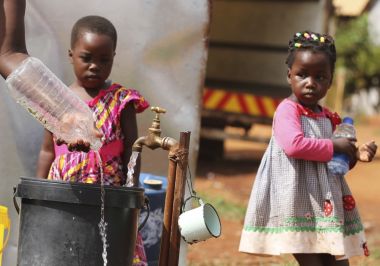33,000 children severely malnourished in Zimbabwe: 'It's like losing an entire generation'

Thousands of Zimbabwean children are in desperate need of treatment for malnutrition and more than four million people now require food aid, it emerged this week, as the country continues to struggle with its worst drought in 20 years.
President Robert Mugabe last month declared a "state of disaster" after two consecutive seasons of failed rains were made even worse by the most extreme El Niño in decades. A drought has swept across large parts of Zimbabwe, in addition to other southern African countries such as Ethiopia and Malawi, and millions are at risk.
The government of Zimbabwe this week announced that a third of the country's population now needs food aid. Food prices have soared – maize, the staple food, is 53 per cent more expensive than last year and food production has halved in that time. As of March 10, the country only had enough maize to last three more months.
"Thousands of children in Zimbabwe and across southern Africa are slipping into malnutrition and death," said Beatrice Mwangi, southern Africa region resilience and livelihoods director at World Vision.
"Many are not going to school due to hunger and this represents a big loss to the communities and countries across the region. If we do not see a positive response in funding, we may see even more children malnourished or dying."
Henry Makiwa, a media manager at World Vision who spent a week in Zimbabwe earlier this month, said the country was already suffering from severe economic challenges and the drought has worsened it. Many children are now being left alone as their parents head to South Africa in search of work, he told Christian Today. The fortunate ones are cared for by their grandparents; those who don't have any are left to fend for themselves.
Makiwa met many children who have been forced to drop out of school. "Some, especially infants, are dying," he added.
According to UNICEF, 33,000 children in Zimbabwe – the majority aged one to two years old – need urgent treatment for severe acute malnutrition. It says $21 million is needed to meet the humanitarian needs of these children in 2016 alone.
Mwangi said the response to the crisis has been too slow and there remains "a huge funding shortfall". The drought is projected to last at least another two years.
World Vision is urging the international community not to forget Zimbabwe and its neighbouring countries amid the other devastating crises currently being faced across the globe.
"We all know that a delayed response usually leads to spending more money trying to rectify the emergencies," Mwangi warned. "We also know that many children across southern Africa have high levels of stunted growth due to poor diets and food shortages meaning this crisis may in future lead to us seeing a generation that is unable to perform to its fullest potential. It's like losing an entire generation."











